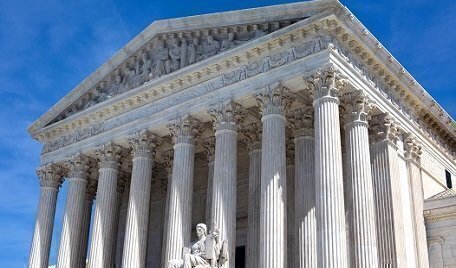Years of declining consumer purchases at retail stores and malls, as shoppers increasingly chose to buy online, have cost state treasuries huge amounts of sales tax revenue, but the Supreme Court might be coming to their rescue. On Friday afternoon, the Justices agreed to reconsider a half-century-old constitutional bar to state taxes on out-of-state retailers.
 After years of refusing states’ pleas for help, the Court granted review of an appeal by the state of South Dakota, in a case that the state’s legislature explicitly created in order to set up a test of the long-standing restriction. Its legislature imposed a sales tax on online retailers who sell to customers in the state, knowing that the state would be struck down unless the Supreme Court changed its mind. That now may happen.
After years of refusing states’ pleas for help, the Court granted review of an appeal by the state of South Dakota, in a case that the state’s legislature explicitly created in order to set up a test of the long-standing restriction. Its legislature imposed a sales tax on online retailers who sell to customers in the state, knowing that the state would be struck down unless the Supreme Court changed its mind. That now may happen.
The restriction dates back to an era when many Americans bought consumer goods from a catalog. In the 1967 decision in National Bellas Hess v. Illinois, the Court ruled that states had he constitutional power to collect sales tax from retailers who actually had stores, warehouses or another “physical presence” inside that state. That put catalog sales off-limits.
In 1992, the issue came up again, but the Court ruled in the case of Quill Corp. v. South Dakota, extended the “physical presence” rule but only for sales taxes on non-state sellers. Repeated pleas by states after that to change the rule failed. Two years ago, however, Justice Anthony M. Kennedy said in an somewhat-related case that the Court should find “an appropriate case” to reconsider the Quill decision and its constitutional reasoning. Congress, too, had often been asked to provide help, but it only studied the question.
South Dakota has chafed under that rule, since it has no state income tax and so relies for much of its revenue on retail sales taxes and on “use” taxes. A “use” is supposedly imposed directly on a consumer who buys from a seller that has no duty to collect a sales tax; some out-of-state retailers do agree to collect such a tax from South Dakota buyers, but that can’t be enforced so it is not done universally. The state needs its tax revenues because its state constitution requires that the state government budget be balanced.
In 2010, the state legislature decided to act. It passed a new law that ordered out-of-state retailers to collect and send to the state a sales tax, if they sold at least $100,000 worth of goods to South Dakota buyers, or if they made at least 200 separate transactions with customers in the state.
Part of the law designed to assure a court test of the state’s new tax gave the state permission to sue out-of-state retailers who failed to collect and pay. State officials then sent out notices of the tax to a long list of sellers it thought were subject to the tax. The state then sued three online retailers that refused to obey: Wayfair Inc., Overstock.com, Inc., and Newegg, Inc.
Because the Quill precedent was still binding, the state conceded that it could not win the case. The state Supreme Court said it had no choice except to follow the Supreme Court precedent, noting that only the Justices themselves can overrule themselves.
State officials then took the case on to the Justices, arguing that other states are beginning to imitate its challenge to the old constitutional doctrine, so the Justices could not long evade the issue. “The action throughout the nation is extensive and complex,” the state’s appeal said.
On Friday, the Justices accepted the invitation. The sole issue they agreed to hear reads: “Should this Court abrogate Quill’s sales-tax-only physical presence requirement?”
The case is expected to draw a long list of supporters and opponents of South Dakota’s challenge. The Justices are likely to hold a hearing on the case is March or April, and decide it before the end of the current term in late June. The fact that the Court is reconsidering the old doctrine does not necessarily mean it will overrule it, but Justice Kennedy usually has a strong influence on outcomes and the constitutional doctrine underlying the Quill precedent has strong critics among some of the more conservative Justices.
The grant of review of the South Dakota case on Friday was among similar grants on ten other cases. Two of those other cases will be heard together; they involve appeals by the state of Texas challenging lower court rulings that struck down as unconstitutional racial gerrymanders the maps drawn for electing several Texas members of the U.S. House of Representatives and several members of the lower house of the state legislature. The lower court rulings have been put on hold by the Supreme Court until the two cases are decided.
Meanwhile, members of the state legislature in North Carolina have asked the Supreme Court to put on hold a new ruling by a lower federal court striking down the map for electing the state’s 13 members of the U.S. House of Representatives. The map is invalid because it resulted from a partisan gerrymandering, giving Republican candidates virtual assurances that they would win 10 of the state’s 13 House seats. The federal court has ordered the state legislature to draw a completely new map within the next two weeks.







